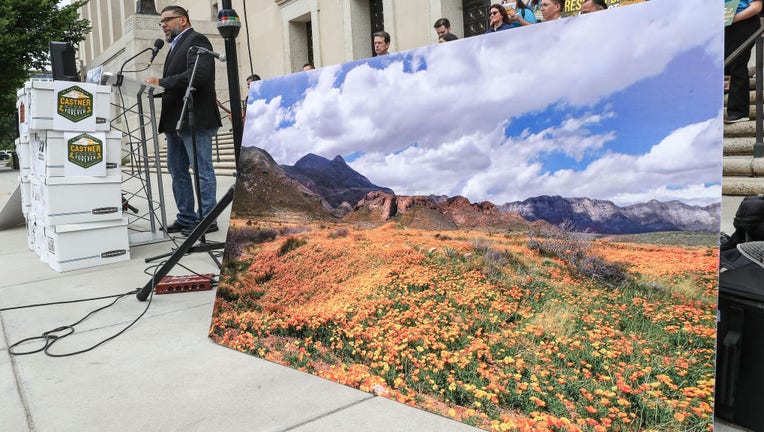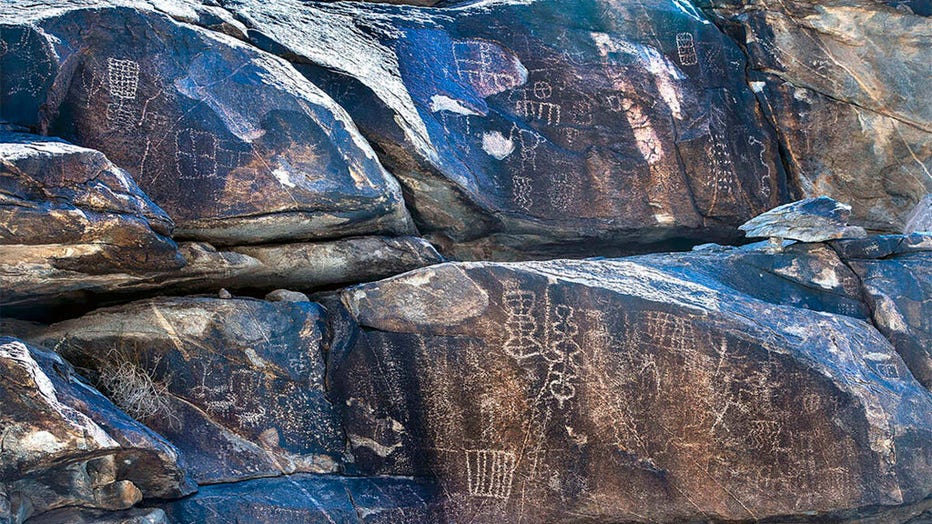Biden designating national monuments in Nevada, Texas

Pastor Moses Borjas of Por La Creación speaks as Castner Range activists deliver over 137,000 petitions calling on President Biden to designate Castner Range the next national monument at the Department of Interior on July 19, 2022 in Washington, DC.
WASHINGTON (AP) - President Joe Biden is establishing national monuments in Nevada and Texas and creating a marine sanctuary in U.S. waters near the Pacific Remote Islands southwest of Hawaii.
The Democratic president is set to announce the measures Tuesday at a White House summit on conservation action at the Interior Department.
Biden said in November that he intends to designate Avi Kwa Ame, a desert mountain in southern Nevada that’s considered sacred to Native Americans, as a national monument. The site spans more than 500,000 acres (202,000 hectares) and includes Spirit Mountain, a peak northwest of Laughlin called Avi Kwa Ame (ah-VEE’ kwa-meh) by the Fort Mojave Tribe and listed on the National Register of Historic Places.

Native American petroglyphs line the rock walls along the canyon bottom in Hiko Springs within the proposed Avi Kwa Ame National Monument site in Nevada. (L.E. Baskow/Las Vegas Review-Journal/Tribune News Service via Getty Images)
The rugged landscape near the Arizona and California state lines is home to bighorn sheep, desert tortoises and a large concentration of Joshua trees, some of which are more than 900 years old.
In Texas, Biden plans to create the Castner Range National Monument in El Paso. The designation will protect the cultural, scientific and historic objects found within the monument’s boundaries, honor U.S. veterans, service members and tribal nations, and expand access to outdoor recreation on public lands, the White House said.
Located on Fort Bliss, Castner Range served as a training and testing site for the U.S. Army during World War II, the Korean War and the Vietnam War. The Army ceased training at the site and closed Castner Range in 1966.
Together, the two new national monuments protect nearly 514,000 acres (208,000 hectares) of public lands.
In the Pacific, Biden will direct the Commerce Department to consider initiating a new national marine sanctuary designation within 30 days to protect all U.S. waters around the Pacific Remote Islands. If completed, the new sanctuary would help ensure the U.S. reaches Biden's goal to conserve at least 30% of ocean waters under U.S. jurisdiction by 2030, the White House said.
Biden also will announce a series of steps to conserve, restore and expand access to public lands and waters across the country, the White House said. The proposals seek to modernize management of America’s public lands, harness the power of the ocean to help fight climate change, and better conserve wildlife corridors. Biden also will announce new spending to improve access to outdoor recreation, promote tribal conservation and reduce wildfire risk.
Biden's actions come as he faces sharp criticism from environmental groups and youth activists over his approval of the huge Willow oil drilling project in Alaska.
Biden has made fighting global warming a central part of his agenda, and White House officials have defended efforts to put the United States on track to meet Biden's goal to cut planet-warming greenhouse gas emissions in half by 2030.
But the decision on Willow has alienated supporters, particularly young activists skeptical about political compromise at the same time Biden is planning to announce his reelection campaign.
Climate activists are expected to gather outside the Interior Department on Tuesday to condemn what they call Biden’s "climate hypocrisy" and demand the administration change course on Willow.
The Willow Project has garnered global attention in recent weeks as a #stopwillow campaign went viral across social media platforms, most notably gaining more than 600 million views on TikTok and amassing more than 4 million signatures on a change.org petition, making it one of the most popular petitions in the website’s history.
White House officials have acknowledged the indignation among Biden’s supporters over Willow but emphasized that oil giant ConocoPhillips has held leases in that area of Alaska for decades, which strengthens the Houston-based company’s legal right to drill.
Environmental groups already have sued in a renewed effort to block Willow.
"Biden has the authority to revoke the Willow approval, withhold permits for further fossil fuel projects and phase out federal fossil fuel production on public lands and waters,'' said Cassidy DiPaola, a spokesperson for People Vs. Fossil Fuels, a coalition of groups pressing Biden to end oil drilling and other fossil fuel projects.
Democratic Rep. Dina Titus and other Nevada lawmakers have been seeking to protect the rugged region near the Mojave National Preserve from development, including solar farms and a proposed wind farm.
"Our creation story places us directly in the center of this area," said Shan Lewis, vice chairman of the Fort Mojave Indian Tribe. "Our efforts are to protect these places of significance and sacredness while maintaining their integrity as a place of home and worship."
The Honor Avi Kwa Ame coalition said in a statement Tuesday that members were "overjoyed" to learn that the site will be a new national monument.
Biden's action will safeguard hundreds of thousands of acres of cultural sites, desert habitats and natural resources in southern Nevada that have great cultural, ecological and economic significance to the state, the group said. The coalition includes tribes, local residents, state lawmakers, conservation groups and and others who have worked to establish the Avi Kwa Ame National Monument.
"Together, we will honor Avi Kwa Ame today — from its rich Indigenous history, to its vast and diverse plant and wildlife, to the outdoor recreation opportunities created for local cities and towns in southern Nevada by a new gorgeous monument right in their backyard," the group said.
Biden designated his first national monument, in Colorado, last year. In 2021, he restored the boundaries for Bears Ears National Monument in Utah after they were significantly narrowed by President Donald Trump, a Republican.

